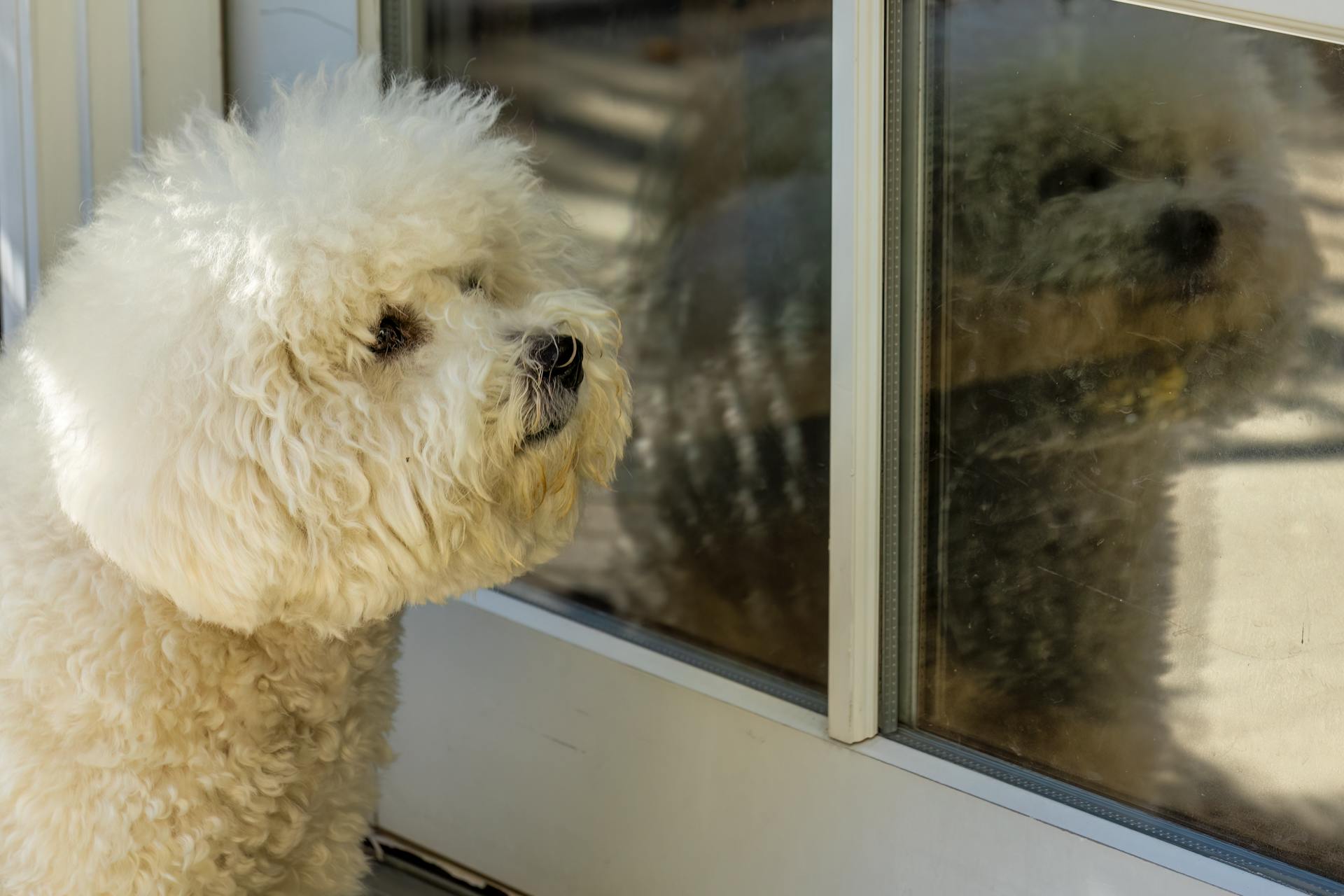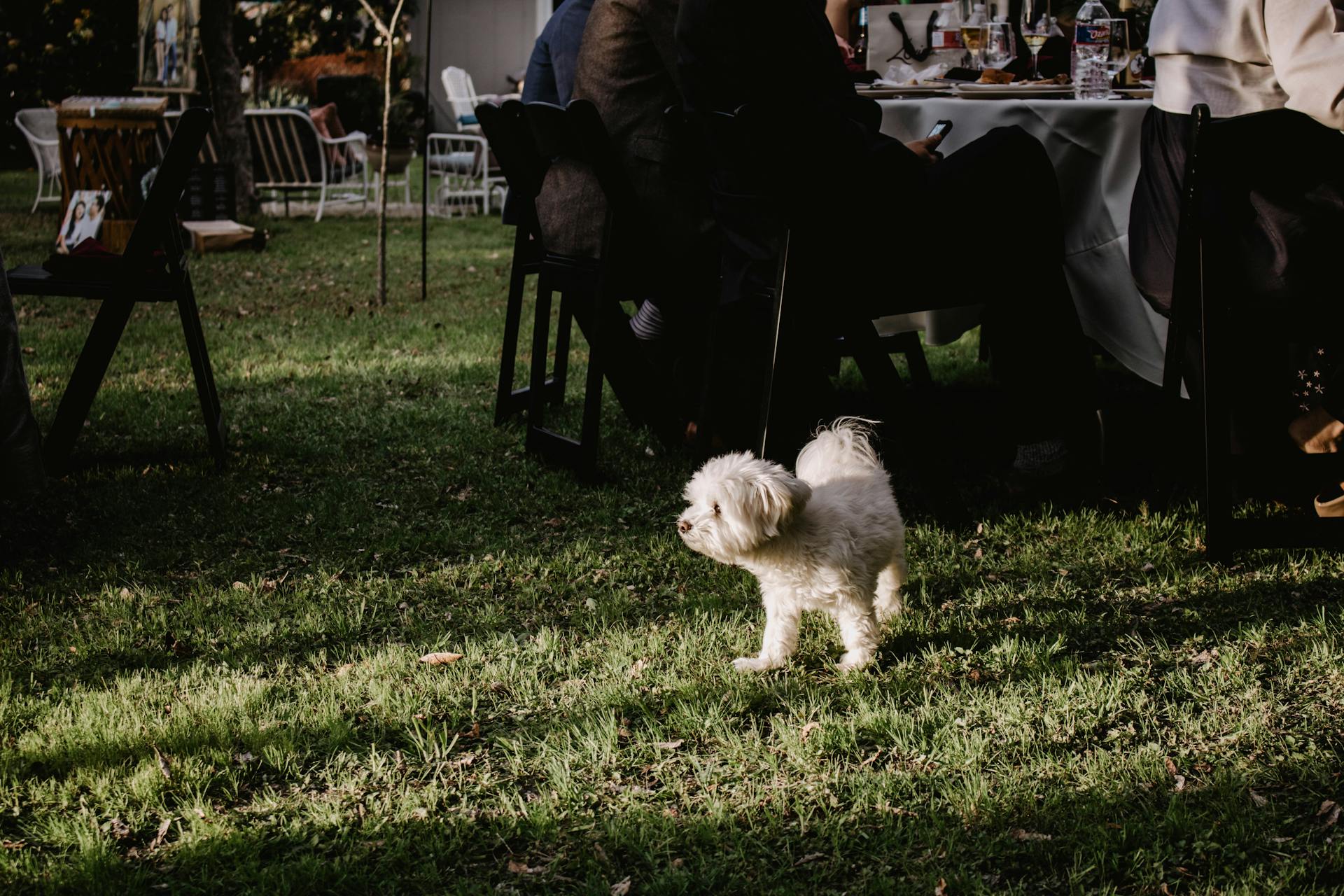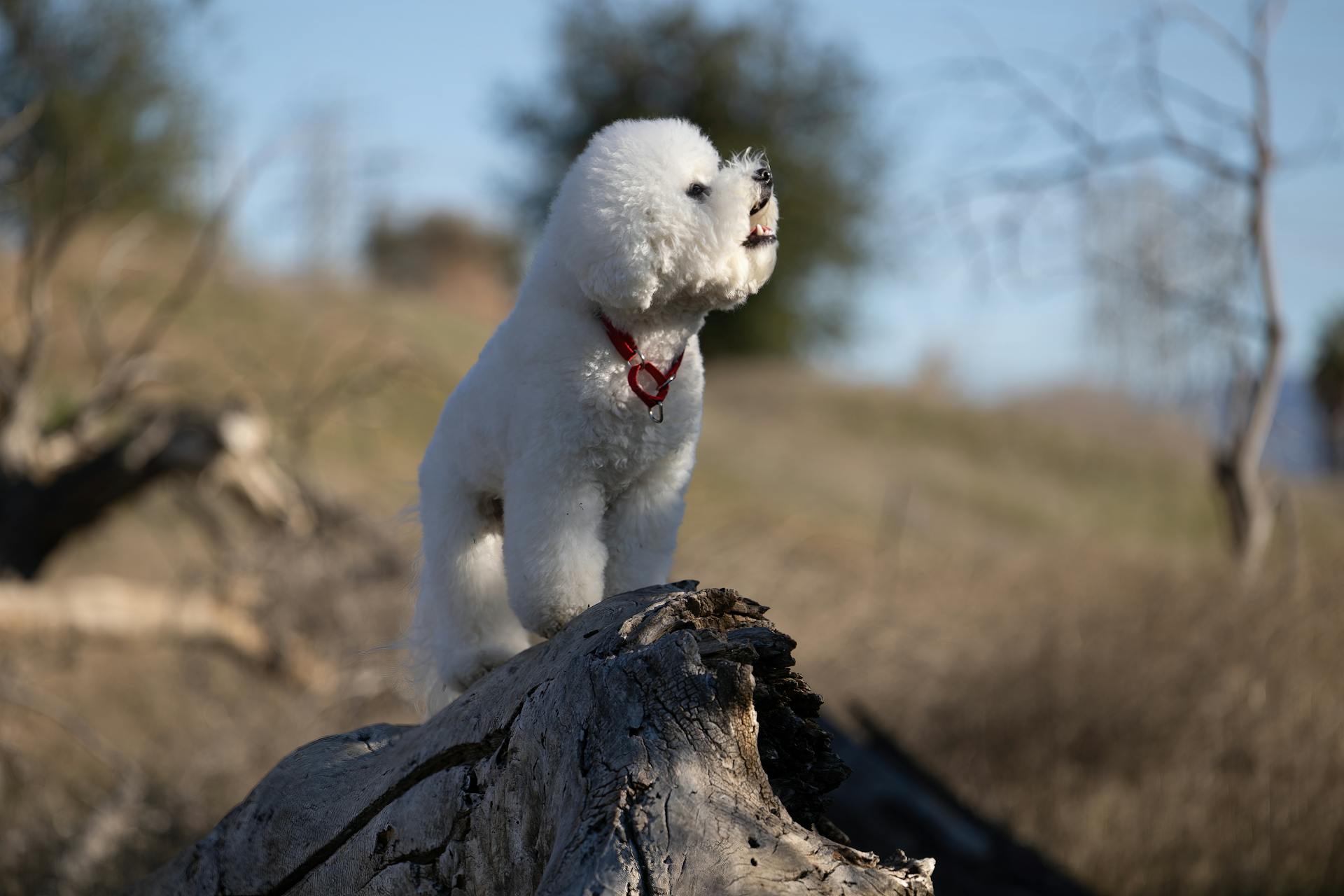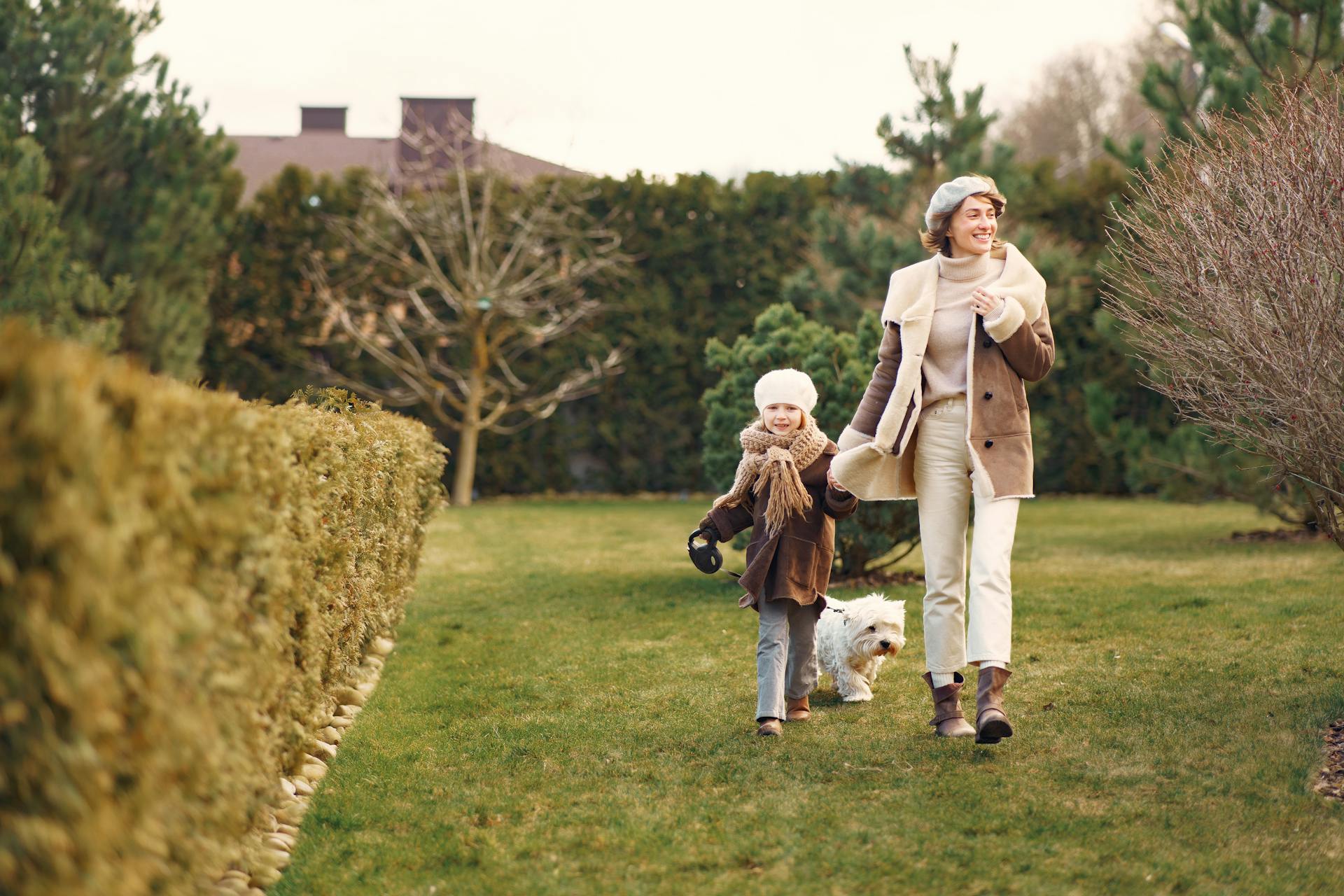
To ensure your Bichon Frise is getting the best nutrition possible, it's essential to understand their specific dietary needs. Bichon Frises require a high-quality dog food that is rich in protein and moderate in fat.
Their small size and delicate stomachs make them prone to digestive issues, so a food that is easy to digest is crucial. A Bichon Frise's ideal food should contain a balanced mix of carbohydrates, proteins, and fats.
Bichon Frises are prone to allergies and food sensitivities, so a hypoallergenic food is a good option. A well-balanced diet can help prevent these issues and keep your Bichon Frise healthy.
You might enjoy: Common Diseases in Dachshunds
Nutritional Needs
Bichon Frises need a diet that supports their energy levels, maintains their coat health, and caters to their overall well-being. This includes a balance of high-quality proteins, fats, carbohydrates, vitamins, and minerals.
Protein is crucial for muscle maintenance, and Bichon Frises require at least 22% protein in their diet, especially during the puppy stage. A good mix of proteins, fats, and carbohydrates is essential for their overall health.
Check this out: Low Protein Food for Dogs Homemade
Fats aid coat health, and sources of good fats include fish oil, flaxseed, and chicken fat. It's essential to balance fat intake to prevent obesity, a concern in smaller breeds.
Bichon Frises are small dogs, typically weighing between 10 and 18 pounds, and their diet should be tailored to their size to prevent obesity-related health issues. A nutritious diet can help prevent health issues down the line.
The caloric intake for your Bichon Frise will vary based on their activity level, with active dogs needing more fuel and less active dogs requiring fewer calories. Aim for around 296-495 calories per day, depending on their lifestyle.
A balanced diet should provide most nutrients, but some Bichon Frises might benefit from supplements, such as joint supplements or probiotics, under the guidance of a veterinarian.
Recommended read: Bernese Mountain Dog Problems
Diet and Feeding
Bichon Frises require a balanced diet that includes essential fats for energy and skin health, such as fish oil and flaxseed.
A consistent feeding schedule of two to three meals daily is beneficial, with portion control crucial to prevent overfeeding. Portion size will vary based on the dog's age, size, and activity level.
Bichon Frise puppies require a diet that supports their growth and development, with puppy-specific formulas providing the necessary calories and nutrients. Joint supplements, such as omega-3 fatty acids, can also be beneficial for coat health.
Regular water intake is essential to promote urinary tract health, and a veterinarian may recommend specialized urinary health diets for dogs with recurrent problems.
Recommended read: Average Weight of Bichon Frise
Feeding Schedule and Portion Control
Bichon Frises benefit from a consistent feeding schedule, typically two to three meals daily. This helps regulate their metabolism and prevent hypoglycemia.
Portion control is crucial to prevent overfeeding, and the portion size will vary based on the dog's age, size, and activity level. Adult Bichon Frises should be fed twice a day.
A Bichon Frise typically requires ½ to 1 ⅓ cups of dry dog food per day, divided into two meals, but this amount can vary depending on their size, age, and activity level. It's essential to consider the caloric density of the specific food you're using.
Check this out: How Much Food Should a Havanese Eat per Day
Free feeding is not recommended for Bichon Frises as it can lead to overeating and obesity. A structured feeding schedule with measured portions is better for maintaining their ideal weight.
As Bichon Frises age, their dietary needs will change, and senior dogs may require fewer calories and benefit from a diet that's high in fiber and includes supplements for joint health. This highlights the importance of adjusting their diet accordingly.
Feeding a Human
Feeding a human food to your dog requires caution. Some human foods can be safe in moderation, but others can be toxic. It's best to stick to a high-quality dog food. Consult with your vet before introducing human foods into your dog's diet.
If this caught your attention, see: Bichon Frise Foods to Avoid
Nutrient Types
Bichon Frises require a diet rich in real meat as the first ingredient, which can help support their coat health and energetic nature.
High-quality, small-breed formula dry dog food is a good option for Bichon Frises, as it caters to their specific needs.
Puppy-specific formulas are ideal for Bichon Frise puppies, providing the necessary calories and nutrients for their growth and development.
Easily digestible proteins and carbohydrates enriched with prebiotics and probiotics can support digestive health in Bichon Frises, especially those with sensitive digestion.
A balanced diet for Bichon Frises must include essential vitamins and minerals, which can often be found in high-quality commercial dog foods.
Fats in a Diet
Fats are essential in a Bichon Frise's diet, providing energy and supporting skin and coat health. Sources of good fats include fish oil, flaxseed, and chicken fat.
It's crucial to balance fat intake to prevent obesity, a concern in smaller breeds. Bichon Frises are prone to obesity if they're overfed, so monitoring their diet is key.
Good fats like fish oil support skin and coat health, but it's essential to find the right balance to avoid health issues. A diet that's too rich in fat can lead to weight gain and related problems.
A Bichon Frise's diet should include sources of good fats like flaxseed, which is a rich source of omega-3 fatty acids. This can help keep their skin and coat healthy and shiny.
Expand your knowledge: Fat Bichon Frise
Carbohydrates and Fiber
Carbohydrates are a vital source of energy for Bichon Frises, providing the fuel they need to stay active and healthy.
Carbohydrates also contain fiber, which is crucial for Bichon Frises' digestive health.
Brown rice is a healthy carbohydrate source that can be easily digested by Bichon Frises.
Vegetables are another excellent source of carbohydrates and fiber for Bichon Frises.
Certain fruits can also provide carbohydrates and fiber, but it's essential to balance their intake to avoid excessive weight gain.
Bichon Frises require a balanced diet that includes a mix of carbohydrates, fiber, and other essential nutrients to stay healthy.
Monitoring your Bichon Frise's digestive health is crucial, and avoiding foods that cause upset can help prevent digestive distress.
For your interest: Heart Healthy Food for Dogs
Essential Vitamins and Minerals
Vitamins and minerals are essential for various bodily functions, including immune health, bone health, and metabolic processes. A balanced diet for Bichon Frises must include these nutrients, often adequately provided in high-quality commercial dog foods.
Vitamins and minerals support immune health, which is crucial for Bichon Frises to fight off infections and diseases. They also play a vital role in maintaining healthy bones and supporting metabolic processes.
A well-balanced diet that includes vitamins and minerals can help prevent health issues in Bichon Frises. This is especially important for young Bichon Frise puppies, who require adequate nutrients for growth and development.
Commercial dog foods often provide the necessary vitamins and minerals for Bichon Frises. However, it's always a good idea to consult with a veterinarian to ensure your Bichon Frise is receiving the right nutrients.
Health and Wellness
Bichon Frises are prone to skin allergies and conditions, so a diet rich in omega-3 and omega-6 fatty acids can help support skin health.
Feeding hypoallergenic or limited-ingredient diets can reduce the risk of allergic reactions. This can be especially beneficial for Bichon Frises with sensitive stomachs or allergies.
A diet that's easy on their digestive system and avoids common allergens is crucial for maintaining their overall health and well-being.
Regular grooming, combined with a balanced diet, is vital for maintaining the distinctive fluffy coat of the Bichon Frise.
A different take: What Food Is Good for Dogs Skin and Coat
Allergies and Skin Conditions
Bichon Frises are prone to skin allergies and conditions that can cause discomfort and irritation.
A diet rich in omega-3 and omega-6 fatty acids, found in fish and certain plant oils, can help support skin health.
Feeding hypoallergenic or limited-ingredient diets can reduce the risk of allergic reactions.
Some common allergens that can trigger skin issues in Bichon Frises include beef, chicken, wheat, corn, and soy.
If you notice signs of allergies, consult your veterinarian for testing and diet modification.
Proteins found in beef, soy, wheat, and sometimes salmon or potatoes are common triggers for skin allergies in Bichon Frises.
Choosing the right dog food for a Bichon with allergies involves looking for natural ingredients free from artificial chemicals.
High-quality dog foods tailored for sensitivities offer balanced nutrition while avoiding common allergens.
Always prioritize canine nutrition that aligns with your furry friend’s health requirements to keep them happy and itch-free.
For more insights, see: Sport Dog Nutrition
Joint Mobility
Maintaining a healthy weight is crucial for reducing stress on joints in Bichon Frises.

Bichon Frises can face joint issues, including patellar luxation, even if they're not as large as some breeds.
Diets supplemented with glucosamine and chondroitin can support joint health in Bichon Frises.
Always consult with a veterinarian before introducing any supplements, including joint supplements like omega-3 fatty acids, which are beneficial for coat health.
Probiotics can also be beneficial for digestive health in Bichon Frises, but again, consult with a veterinarian before adding them to your dog's diet.
Urinary Diet
When it comes to maintaining your Bichon Frise's urinary health, diet plays a crucial role. Bichon Frises may be prone to urinary tract issues, including bladder stones.
A diet with controlled levels of minerals like calcium and phosphorus can help promote urinary tract health.
Regular water intake is also essential for your Bichon Frise's urinary health.
A veterinarian may recommend specialized urinary health diets for dogs with recurrent problems.
Eye
Eye health is crucial for our furry friends, and some breeds are more prone to eye issues than others. Bichon Frises, for example, can suffer from cataracts.

Regular veterinary eye exams are essential for early detection and management of eye issues. This can help prevent vision loss and improve overall quality of life.
A diet rich in antioxidants like vitamins C and E, lutein, and beta-carotene can support eye health. These nutrients can be found in foods like leafy greens, sweet potatoes, and carrots.
Nutrition and Coat Maintenance
Bichon Frises require a diet rich in omega-3 and omega-6 fatty acids to support skin health and reduce the risk of allergic reactions.
A balanced diet that includes high-quality proteins, fats, and carbohydrates is essential for maintaining a healthy coat.
Sources of good fats include fish oil, flaxseed, and chicken fat, which provide energy and support skin and coat health.
However, it's crucial to balance fat intake to prevent obesity, a concern in smaller breeds.
Regular grooming complements nutritional efforts to keep their distinctive fluffy coat in top condition.
A diet with a good balance of high-quality proteins and essential fatty acids is vital for coat health.
Bichon Frises require at least 22% protein in their diet to support rapid growth, especially for puppies.
Choosing premium pet food that provides balanced nutrition without packing extra pounds onto your companion's small frame is essential to prevent obesity-related health issues.
Discover more: Is High Protein Dog Food Good for Dogs
Human and Pet Hazard
As a Bichon Frise owner, it's essential to know what human foods are safe and unsafe for your furry friend. Certain human foods, such as lean meats, vegetables, and fruits, can be safe for Bichon Frises in moderation.
Chocolate is a major no-no for Bichon Frises, as it's toxic to dogs. Grapes, onions, and xylitol products are also off-limits.
Regular veterinary check-ups and monitoring your Bichon Frise's diet and body condition are crucial to maintaining their health. A balanced diet that fulfills their specific nutritional needs is vital to preventing common breed-specific health issues.
Bichon Frises are generally healthy dogs, but they're susceptible to certain health issues, such as those related to their diet. Understanding these health challenges and the role of diet in managing them is essential for any Bichon Frise owner.
On a similar theme: Homemade Food for Dogs with No Teeth
Is My Child Getting Enough?
Bichon Frise puppies need a diet that supports their growth and development, so choose a puppy-specific formula designed for small breeds.
Regular check-ups with your vet can help determine if your Bichon Frise's dietary needs are being met.
Ensure that the dog food you choose is AAFCO certified, which means it meets the nutritional standards required for dogs.
AAFCO certification is a good indicator that your Bichon Frise is getting the necessary calories and nutrients for growth and development.
Frequently Asked Questions
What foods are Bichon Frise allergic to?
Bichon Frises are often allergic to soy, wheat, and sometimes potatoes, which can cause skin issues and discomfort. If you suspect your Bichon Frise has a food allergy, consult a veterinarian for proper diagnosis and treatment
Do Bichon Frise eat a lot?
Bichon Frises don't require a lot of exercise, but they can easily overeat if not fed a balanced diet. They thrive on three to four small meals a day until six months old, then two meals a day.
Sources
- https://petdirect.co.nz/p/bichon-frise-adult-dry-dog-food/
- https://iheartdogs.com/ideal-diet-for-bichon-frises-the-ultimate-bichon-frise-feeding-guide/
- https://iheartdogs.com/how-much-do-you-feed-a-bichon-frise/
- https://www.dogfoodadvisor.com/best-dog-foods/bichon-frise/
- https://dogtime.com/reviews/best-dog-foods-for-bichon-frise/
Featured Images: pexels.com

